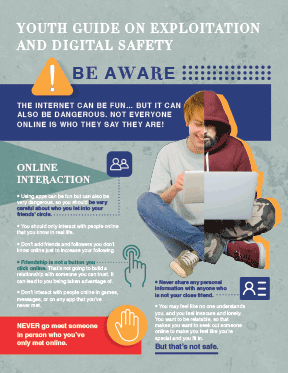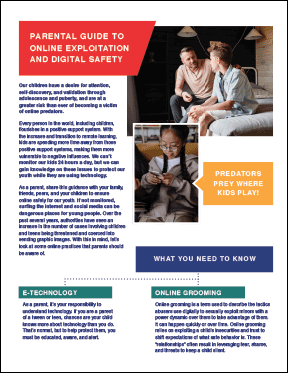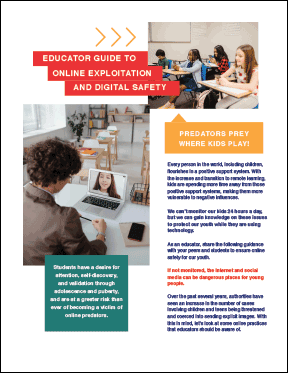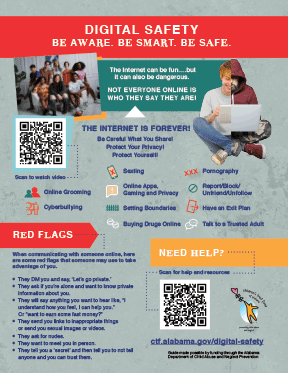
Our children have a desire for attention, self-discovery, and validation through adolescence and puberty, and are at a greater risk than ever of becoming a victim of online predators. Every person in the world, including children, flourishes in a positive support system. With the increase and transition to remote learning, kids are spending more time away from those positive support systems, making them more vulnerable to negative influences. We can’t monitor our kids 24 hours a day, but we can gain knowledge on these issues to protect our youth while they are using technology. This information is meant for you to use as a tool, and share what you learn with your peers, and your children to ensure online safety for our youth.

THE INTERNET CAN BE FUN… BUT IT CAN ALSO BE DANGEROUS.
NOT EVERYONE ONLINE IS WHO THEY SAY THEY ARE!
If not monitored, surfing the internet and social media can be dangerous places for young people. Over the past several years, authorities have seen an increase in the number of cases involving children and teens being threatened and coerced into sending graphic images. Technology, including social media apps and gaming, is a continually changing landscape and part of the daily lives of children and teens, including at school and leisure. Predators are luring child victims online via mobile phones, computers, tablets, even video game consoles. So, how do we protect them from these online dangers? We must be educated and aware of what these dangers are and learn how to prevent them.
Make it a priority to be involved in your children’s lives. Be aware of who they are interacting with online through games and apps. Know how apps, games, and DMs (direct messaging) work so that you will know what to look for. Ask your child to show you and help teach you. They will most likely know more than many adults.
Be educated about privacy settings and share with your kids the importance of having the correct privacy settings on all apps and online gaming platforms they use. Talk with your kids about setting boundaries with their technology. Creating healthy tech habits is an important part of protecting your kids online and offline.
We care deeply about you and the children in your life and want to provide resources to help you protect them in this ever-changing digital age. This series of videos and resource guides discuss topics related to digital safety, awareness, and prevention. These are effective tools for increasing public awareness or as tools to support training for educators, law enforcement, service providers, lawmakers, engaging parents, and other community members in a dialogue on the importance of prevention and digital safety.
In our videos and digital guides, you will learn about these issues and more:
Online Interaction
Online Grooming
Cyberbullying
Sexting
Online Apps, Gaming and Privacy
Setting Boundaries
Buying Drugs Online
Dangers of Pornography
Safety Tips
Promoting Digital Wellness
Privacy Settings
Red Flags
Resources
THE INTERNET IS FOREVER. Be Careful What You Share!
Protect Your Privacy! Protect Yourself!
Online sexual exploitation most commonly includes grooming, live streaming, consuming child sexual abuse material, and coercing and blackmailing children for sexual purposes. As technology advances, new forms of this crime emerge. Never before has it been easier for perpetrators to make contact with children. There are many different studies that say the average age of first exposure is age 8-9, sometimes “kids as young as 4” are being exposed while playing games on their parents’ devices.
Preventing online exploitation can’t be done through a single conversation, and it won’t be accomplished just by telling kids “don’t” or by restricting access to technology. Grooming can look a lot like making a friend—it might not be clear it’s happening for a long period of time. The fact is that kids are going to be online, no matter what adults do or say, and that adds a new layer of risk to growing up.
Online grooming is a term used broadly to describe the tactics abusers deploy through the internet to sexually exploit children. It can happen quickly or over time, but at its core it’s a process of exploiting trust to shift expectations of what safe behavior is and leveraging fear and shame to keep a child silent.
In addition to sexually graphic photos, be sure your child isn’t posting sensitive information like their phone number, email address, birthday, or where they live, go to school, or involvement in sports. As a parent, be careful and don’t post photos with identifiers in the picture, like your home, child’s school, or sport’s field in the background, or even photos of your child in their school t-shirts or sports uniform.
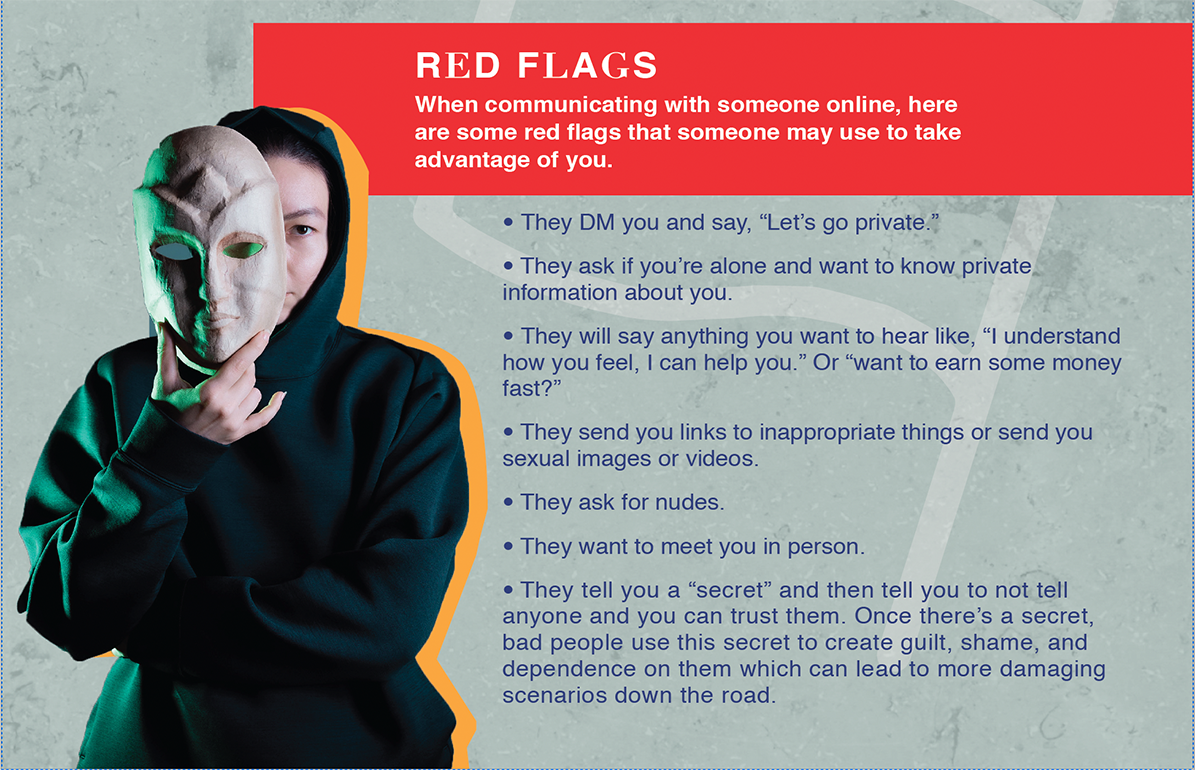

NEVER GO MEET SOMEONE IN PERSON
THAT YOU’VE ONLY MET ONLINE.
As parents, caregivers, allies, and educators, we must work every day to ensure young people feel safe enough to come to us if a decision they made goes sideways. Not having these conversations doesn’t protect them from the harm, it leaves them ill-equipped to know how to handle a problem when it happens. Building a foundation of trust, where a child feels safe all of the time, can build the safety net kids need to be able to come to you when something scary happens.
Fear of getting in trouble is a major factor in a child’s decision to avoid asking for help. Online predators and exploiters know this, and a child will often be subjected to prolonged sexual abuse rather than risk discovery by a parent. If your child has engaged in sending graphic posts, or receiving them, remain calm and supportive. Your child is likely the victim of a crime and needs your support and protection, not criticism or punishment. Consider seeking help from a therapist or counselor if any incident causes you to be concerned about the mental health of your child.
In addition to sexually graphic photos, be sure your child isn’t posting sensitive information like their phone number, email address, birthday, or where they live, go to school, or involvement in sports. As a parent, be careful and don’t post photos with identifiers in the picture, like your home, child’s school, or sport’s field in the background, or even photos of your child in their school t-shirts or sports uniform.

